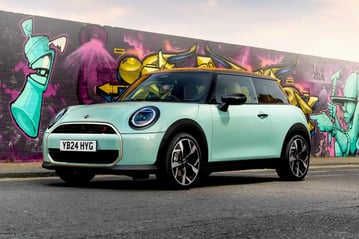- Carmoola
- Blog
- Cars and Gadgets
- How much does mileage affect car value?
- 🗞 Cars and Gadgets
- Last updated: Feb 11, 2022
- 9 Min Read
How much does mileage affect car value?
Written by

Verified by


See how much you can borrow in 60 seconds
| Representative Example | |
|---|---|
| Loan amount | £10,000 |
| Interest rate | 13.9% APR |
| 54 payments of | £246 |
| Total cost of credit | £3,284 |
| Option to purchase fee | £1 |
| Total payable | £13,285 |
One of the biggest joys of having a car is taking to the open road, going on adventures and road trips with the wind in your hair and not a care in the world. But these adventures - and the less exciting trips, like ferrying the kids around or doing the grocery shop - can rack up your car’s mileage.
This matters because the number on the odometer (the thing on the dashboard that measures your mileage) has a bearing on how much your car is worth. Let’s take a look at how and why mileage has such an impact on your car’s value.
Why does mileage affect car value?
When you’re shopping for a car, the mileage is often a kind of shorthand for the car’s overall condition. It makes sense that a car that’s driven more miles will have more wear and tear, particularly on things like the engine, brakes, and suspension.
This means there’s a higher chance the car will need repairs or replacement parts in the future, which is why a car with higher mileage will typically have a lower value when it comes to selling it on or trading it in.
What is considered ‘high mileage’?
When you’re looking at mileage numbers, it can be hard to know what counts as ‘high mileage’. For the average car, it’s generally expected it would do 10,000 - 12,000 miles a year. So if you’re looking at a three year old car with a mileage of 30,000-ish miles, that would be considered average.
But, it’s not just about the number of miles - it’s worth considering the type of vehicle as well. For example, SUVs are designed to be robust enough to handle a lot of miles, and lots of drivers choose them for this reason. It’s fair to expect an SUV to do anything from 12,000 - 18,000 miles a year. On the other hand, luxury cars tend to do way fewer miles per year, in the region of 8,000 - 12,000 a year.
If the mileage on a prospective car works out much higher than these annual averages, then it’s more likely the car has had more wear and tear to its main components, so you may be looking at expensive repairs in the not-too-distant future. These cars are likely to come with a smaller price tag because of this.
How much does mileage decrease a car's value?
When it comes to working out a car’s value, mileage has a big impact. It’s not an exact science, but as a broad rule, a car will lose around 20% of its value for every 20,000 miles on the clock.
Here’s an example. Let’s say you buy a car for £20,000. You have some great adventures and make tons of memories in it, and then after a few years you decide it’s time to say goodbye (never an easy decision, we know). By this point, you’ve racked up 40,000 miles. Based only on the mileage, the car would now be worth around £12,800 when you sell it on. It would have dropped from £20,000 to £16,000 when it hit the first 20,000 miles, and then gone from £16,000 to £12,800 when it did another 20,000 miles - losing 20% of its value each time.
If you kept the same car for longer, and road-tripped your way to, say, 100,000 miles, you’d be looking at a resale value of £6,553, as the car would lose another 20% of its value each time you clocked up another 20,000 miles.
But, bear in mind that while mileage is certainly important to a car’s value, it’s far from the only thing that affects the depreciation rate. The amount your car is worth will also depend on its age, the condition it’s in, its service history, and how reliable it is, as well as external factors like general market demand.
Mileage impact on different types of cars
Mileage affects the value of all cars, but not necessarily in the same way. Not all cars are created equal, so some types of vehicles will hold their value better than others, even with a higher mileage.
For instance, mileage affects electric cars differently to petrol cars. With electric vehicles (EVs), higher mileage tends to affect the battery health more than other components. EV batteries lose capacity as time goes on, which can reduce the vehicle's range and efficiency. Most modern EV batteries are designed to last 100,000 - 200,000 miles, but you’ll often start to notice a decline after 100,000 miles. EVs can lose value quickly at first, but this will even out as long as the battery stays healthy over time.
On the other hand, petrol cars sustain most of their wear and tear in the engine, transmission, and other moving parts. High mileage on a petrol car can affect the engine’s efficiency, and lead to potentially expensive repairs. This is a big reason why petrol cars depreciate faster with higher mileage, compared to electric cars.
When it comes to luxury cars, the mileage impacts slightly differently. High-end cars tend to be built with high-quality components and materials that can handle mileage better than budget cars. But, when those parts do eventually wear out, replacement costs for luxury cars are typically a lot higher than they would be for budget cars. So higher mileage on a luxury car can lead to much more expensive repairs.
A luxury car with high mileage is likely to depreciate quite drastically, partly because buyers in the market for these cars tend to prefer lower-mileage, pristine-condition rides.
Compared to this, budget cars often keep their value more steadily over time. High mileage still contributes to the depreciation of more affordable cars, but the impact isn’t as harsh compared to high-end, luxury cars.
How can you minimise the impact of high mileage?
The most obvious way to reduce the impact of high mileage is to keep your mileage as low as you can, so you’re not adding too much to the ever-ticking odometer. Failing that, there are other things you can do to reduce the effect that high mileage will have on your car’s depreciation:
- Look after the car - make sure you get any damage fixed as soon as you can
- Get the car serviced regularly - follow the manufacturer’s guidelines for servicing, and keep your service records together in one place
- Do your research - when you’re shopping for a new car, it’s worth choosing a make and model that’s known for being reliable over long distances
Mileage and car finance agreements
If you buy a car on finance, particularly with a Personal Contract Purchase (PCP) agreement, then you’ll need to keep a keen eye on your mileage. As part of your agreement, you’ll agree to stick to a specific mileage limit - for example, 12,000 miles a year - and you’ll have to pay a fee if you go over this limit.
PCP agreements are designed so that your monthly payments cover the car’s depreciation during the term - that is, the amount of value the car loses over the time you have it. The lender usually works out what the car will be worth at the end of the agreement - this is known as the Guaranteed Minimum Future Value (GMFV). They calculate your monthly payments to cover the difference between the car’s original value and the GMFV. Mileage is one of the things that has a significant impact on the car’s value, and very high mileage will bring down the car’s residual value more than the lender has predicted - that’s why they’ll typically charge you a fee if this happens.
Should you buy a high mileage car?
When you’re shopping for a new set of wheels, its mileage is an important factor to consider, but it’s not the be-all and end-all. Sure, high mileage cars may need more repairs, and you’ll need to be extra diligent when it comes to keeping on top of servicing and maintenance, but there are some potential up-sides too.
The obvious one is that higher mileage cars will usually be cheaper to buy, but you might also find that the insurance is cheaper as well. You could also say that a car that’s been around the block a few times has proven itself to be trustworthy. An engine that’s been used frequently may actually run more smoothly than one that’s had less use over the same period of time.
So make sure you check the mileage when you’re picking out your next set of wheels, but don’t decide on the basis of the odometer alone.
FAQs about mileage affecting car value
At what mileage does a car’s value drop the most?
What is considered high mileage for a car?
It depends on the type of car. For most average cars, you’d expect a mileage of around 10,000 - 12,000 a year - so anything above this would be considered high.
For SUVs, which are designed to handle a lot of miles, you’d expect them to do between 12,000 and 18,000 miles a year - more than this would be considered high.
At the other end of the scale, luxury cars tend to clock up fewer miles - in the region of 8,000 - 12,000 miles a year - so an annual mileage above this would be seen as high.
Can high mileage cars still be valuable?
Yes, a high-mileage car can still retain its value, as long as it’s well maintained and in good condition. Lots of factors come into play when working out a car’s value, and mileage is just one of them. If the car has a reputation for reliability, and has been serviced regularly, a high mileage shouldn’t hit the value too much - particularly if there’s a strong market demand for it.
How does mileage affect PCP or HP agreements?
See how much you can borrow in 60 seconds
| Representative Example | |
|---|---|
| Loan amount | £10,000 |
| Interest rate | 13.9% APR |
| 54 payments of | £246 |
| Total cost of credit | £3,284 |
| Option to purchase fee | £1 |
| Total payable | £13,285 |
Related articles
What Are the Top 5 Used Car Websites in the UK?
Thanks to the internet, searching for a used car in the UK is easier than ever before. You can simply head online, visit a used...
What Is GMFV in PCP Car Finance? Guaranteed Minimum Future Value Explained
GMFV, or Guaranteed Minimum Future Value, is the amount your lender estimates your car will be worth at the end of your PCP...
Does Financing a Car Build Your Credit?
Financing a car can build credit when you make payments on time, but it can damage your score if you miss payments or take on...

.webp?width=832&height=592&name=customer-support%20(1).webp)










.webp?width=400&height=285&name=online-shoppers-with-dog%20(1).webp)


.jpg?width=500&height=356&name=Vintage%20car%20going%20to%20an%20old%20town-1%20(1).jpg)





